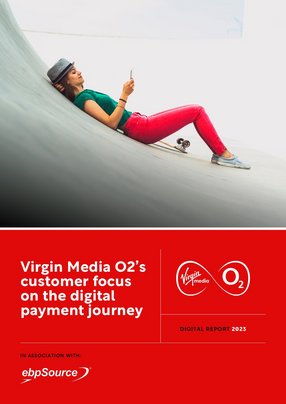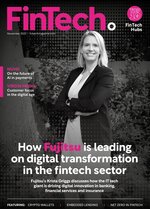Virgin Media O2’s customer focus on digital payment journey
There’s no imagining what the world would look like without the media, connectivity, mobile devices, and the ability to stream anything, anywhere, at any time. Society currently thrives off access to modern mediums of communication and also hinges their ability to adapt to customer needs and overcome the challenges by proactively mitigating them.
This can also be translated into core business functions, of which payments is one of the hottest topics right now for a number of reasons. Businesses need to make money, which means they need to be able to acquire it from their customers effortlessly. This trend of ease must also be carried across to consumer engagement as they benefit from timely, seamless payments for their purchases; one-off payments and subscriptions.
There’s also something to be said for offering customers more flexibility with their payments in today’s society, not only for the literal sense of the word, but also to ensure elements like contracts or subscription services are compatible with their financial needs.
This is summed up by Virgin Media O2’s Payment Strategy Lead, a long-term advocate of the business, David Cox. Having worked at Virgin Media O2 for more than 20 years, Cox is well-positioned to be a leader in his domain but also a spokesperson for how the company approaches operations to ensure that the customer gets the most value for their commitment.
Supporting customers, digital or not
According to Cox, network growth underpins everything that Virgin Media O2 does and the core mission for him is to amalgamate systems with technologies and partner services to provide the best possible experience for its customers. This is a response to the overwhelming number of bills received by customers, which can all be simplified into one single element.
“Lots of businesses historically may have received a bill for their mobile service and a separate bill for broadband, so by amalgamating systems, customers can have more choice around how they are billed, making things really clear and simple for the customer,” says Cox.
“Customer experience and customer service are our key focuses. From an employee perspective, it's about cross-skilling — working together to ensure we provide the best customer experience and continue to grow the business.”
Following this point, Cox also delves into the kind of industry that Virgin Media O2 contends with and boasts its ability to compete with oncoming technologies.
“Apart from things moving faster, the business is very competitive and our industry is very fast-moving. We are more agile than we ever were. The thing that’s probably challenged us most over the past few years is the impact of Covid-19 and lockdown. It was a huge learning experience for all. I think what we saw during lockdown was a change in customer behaviour so customers who wouldn't naturally be what we call ‘digital’ were forced to because they had no other option. A lot more customers use digital services now, and benefit from being able to self-serve at a time that suits their circumstances and lifestyle”
This is seen everywhere in 2023: the rise of digital payment solutions and the gradual reduction in the use of cash, although there was a slight increase in 2023 due to the cost of living crisis. But, while it’s always fun to think about where payment technology will be in the future, we must not forget that some demographics could get left behind — which is all part of the Virgin Media O2 customer commitment.
“It takes time for consumers to adapt, even to contactless,” says Cox. “I remember how long it was out there before people started to use that technology. In London they called it the ‘TFL moment’, but outside of London it was more the, dare I say, the latte moment when you could actually pay for your coffee without having minimum fees and minimum values attached.
“Initially, when that first came out, consumers were very wary of what happens if they lose their card. ‘What happens? Someone else could use it’. So, with any new payment method, it just takes time for people to get familiar and to trust it, which is one of the challenges ahead of us.”
Growth is the goal and is enabled by digital technology
In such a rapid chain of events, the world has moved into a very autonomous way of working and the majority of consumers today are able to adopt changes much faster thanks to the generational increase in digital literacy. But Virgin Media O2 recognises that not everyone is that way inclined. Although the majority of new customers are open to digital, there remains a large enough population to warrant manual consumer engagements — and it’s something the company will offer until, and if, this way of customer service naturally phases out.
In fact, being a major player in the industry puts Virgin Media O2 in a great position to influence the industry through supporting regulators to generally focus the trajectory of media and communications. Having worked with Pay UK, Cox explains how his work helps build a suitable regulatory structure to suit businesses and their loyal service users.
“We flag anything that would negatively or positively impact a merchant. We work with the regulators a lot to ensure that the end-state product delivers what our front-end consumers are looking for. The other thing we keep flagging, which just gets forgotten sometimes, is meeting the needs of all demographics. When I bring this up in meetings, some people within those meetings are still surprised that not everyone actually has a smartphone,” says Cox.
It is always somewhat refreshing to see that Cox’s approach to customer service isn’t just about how they interact with the business, but he also likes to understand consumers' desires from a much deeper perspective.
“Some of our consumers still go to the local post office to pay their bill. Not always because they couldn't pay by other means, it may be because the cashier could be the only person they see, or it may literally be the only trip out in the week,” Cox explains.
“We must remember to meet the needs of all customers, demographics and backgrounds rather than just assuming everyone's got a smartphone, or that everyone wants to go digital.”
He refers to this as a ‘balancing act’ as he also addresses the idea of digital disparity of those that actually use technology to make their payments to Virgin Media O2.
“With the payment landscape ever changing, we must work with providers of digital wallets like Google Pay/Apple Pay/Click To Pay or indeed, open banking — any of those. We should ensure that whatever we put in front of our consumers, close to 100% of our customers could, in principle, use that function and trust it; know it’s secure and know that we’ve done all we can to develop it from a consumer perspective,” Cox says.
Payment solutions that echo customer commitment
When it comes to services, Cox explains, Virgin Media O2 leans on a number of providers to really enhance the experience for its customers. In his role, Cox is tasked with a strategic focus on those partners and their services as the company shifts towards organisations delivering more advanced projects. Open-banking being the key and evolving focus for the industry at the moment means that Virgin Media O2 steers itself away from legacy systems in order to remain current.
“What we've done in the past year is replatformed with all of our payment service providers to their latest platforms, which gives us that agility to switch on and off certain payment methods — they’re robust, secure, up 100% of the time and that's what our customers expect,” says Cox.
“They expect everything to be working 100% of the time, not to try and connect to the wifi at 7pm and find that it’s not working. I think stabilisation of our platforms and services is something we've very much been focused on. By having an agile platform, whether it's payment service providers or internal, we then gain the ability to pilot different solutions to meet customer needs.”
To deliver these agile, rapidly evolving, ‘always-on’ payment offerings, the company pays close attention to the approach of ebpSource, one of its main, strategic digital billing and payment partners, who are capable of meeting the needs of the business around the clock. Naturally, with customers expecting their services to be available 24/7, the company relies on a partner that is able to update and service its solutions in the least disruptive way possible whilst being at the forefront of the latest developments in digital payments.
“ebpSource was founded back in 2006, by one of the most experienced teams in the global electronic billing and payment industry. Our collaboration with ebpSource started from those early days and has evolved to support the extensive digitisation of the business across many areas of our digital domain; billing and payments being a key part of that journey strategically. They understand our business and how new technology needs to work within existing frameworks, business processes, technical processes and IT environments. Additionally they bring us the value of their cross-industry experience, working not only in telecoms but also with utilities, financial services and payment processors” Cox says.
This sets the company on the path towards further growth in the digital arena. Open banking being the key trend that Cox expects to see more involvement within the future, Virgin Media O2 is continually evolving to bring its customers into the digital realm and remain up-to-date with the latest technological trends and discoveries. In doing so, open banking, he expects, will further streamline the payment process for digital customers, making it a more appealing concept for the majority.



